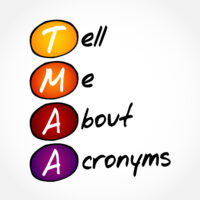05
Digital Marketing Acronyms Influencing Your Practice

It’s easy to feel overwhelmed by all the acronyms and vocabulary used to explain digital marketing.
Let us help! In this blog post, we have compiled a few key acronyms to help you begin to decrypt the online marketing jargon.
SERP – Search Engine Results Page
A SERP is the result of every search query. Once you perform a search query on a search engine like Google (for example, “pizza near me”) a list of results will compile to help you find the most accurate website listing result for your request.
SEO – Search Engine Optimization
SEO is the strategy and foundation for websites to be listed organically through search engines. This tactic is based on catering to the algorithms search engines use to decide how rankings will appear based on a user’s search query.
SEM – Search Engine Marketing
SEM was once a term that was interchangeable with SEO. However, as search evolved over the years SEO became autonomous to SEM. The term SEM now typically refers to paid search results within the SERPs or on websites while SEO refers to organic listings that cannot be manufactured through paid efforts.
PPC – Pay Per Click
PPC represents paid advertising available for each search engine. For example, Google Ads is Google’s online advertising platform. When a patient conducts a search in Google they often receive a SERP with paid search results. Sometimes ads appear on websites themselves. The PPC results on a SERP include a little “AD” tag next to them, which indicates they are advertisement listings.
UX – User Experience
It isn’t enough to speak to a search engine algorithm or pay for advertising if your patient will receive a confusing, slow, or an awful customer experience when they land on your website.
A bad website user experience will not inspire a patient to take action and call your office. Your website represents the first step towards your patients building confidence in the experience they will receive.
CTA – Call To Action
CTA is a great way to describe banners, buttons, icons, images, and such. If it encourages the patient to take immediate action then it can be described as a CTA. Does it inspire a patient to take action, buy a product, make an appointment, or even call the office? If so, it’s a successful CTA.
Do you still have questions about acronyms? Don’t hesitate to give our Sesame Social and SEO teams a call for more information!
—Rebekah McBride, Senior SEO Specialist, Sesame Communications
